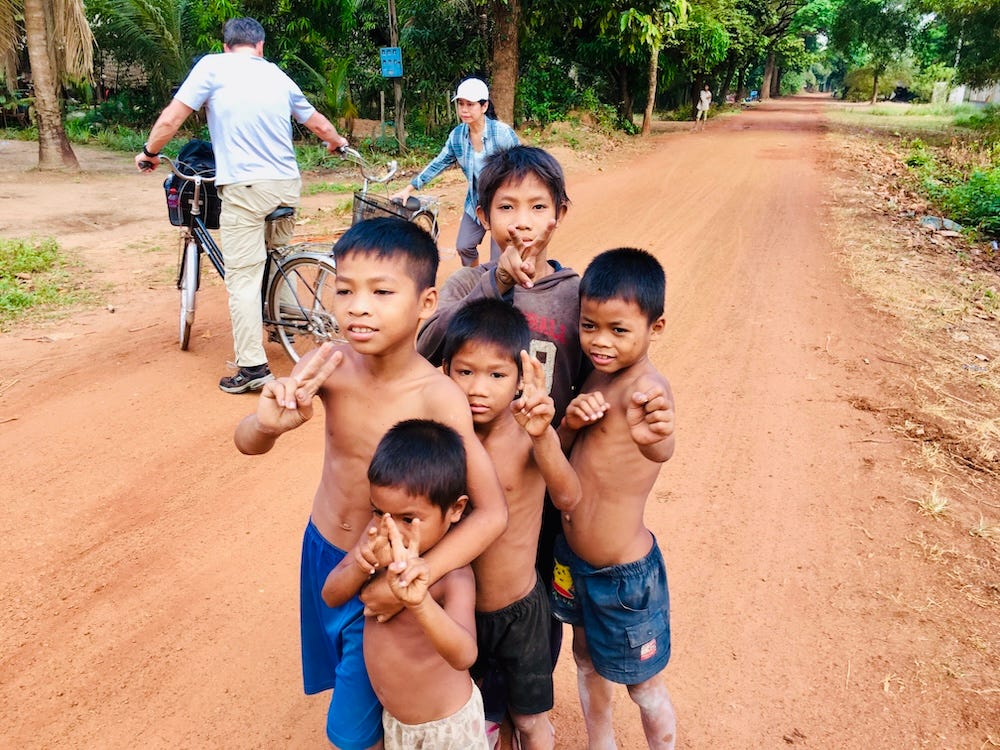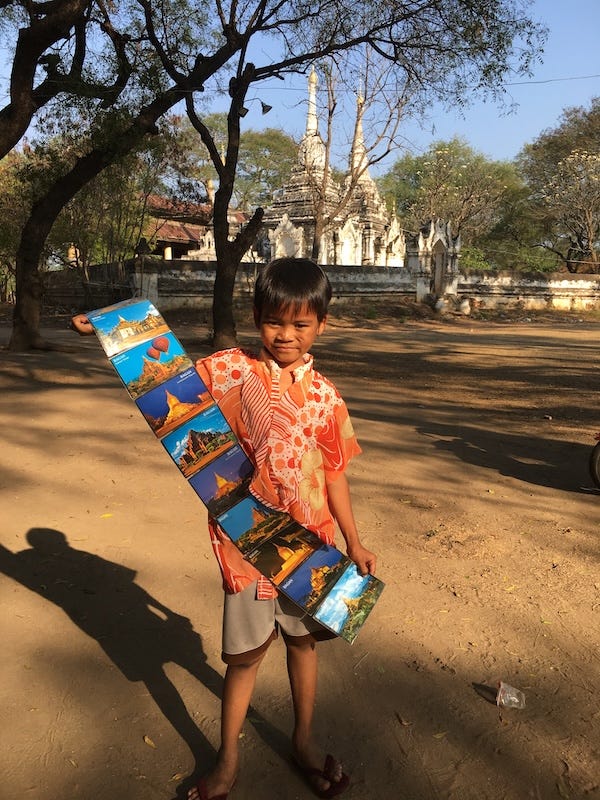What Having Nothing Taught Me About Having Everything
How a group of Cambodian children changed my perspective on wealth
"$1 dollar, $1 dollar," the little girl thrust out her dirty little brown finger, an oddly shaped origami style paper bird bobbed about at the bottom of a piece of string.
"$1 dollar, $1 dollar," young beautiful deep brown eyes pleadingly searched my face as she waved her handmade souvenir at the tall strange white woman in front of her.
Suddenly there was a chorus of "$1 dollar, $1 dollar," as she was joined by a dozen more grubby little fingers all bouncing and waving their toys, hoping to be the ones to return with a piece of gold for their efforts.
I looked at my van mates. My sister was rummaging around in her bag to find some dollar bills, and the driver was telling me to get in the van before I disappeared beneath the growing crowd of young faces.
I grabbed a few dollars from my pocket and handed them out, as the kids whooped and cheered, thrusting their homemade crafts proudly into my hands, knowing they would be the ones to get a kiss on the head tonight.
That moment, standing on the dusty road of a small Cambodian village surrounded by those laughing children with their hand crafted paper toys, has stayed with me for years.
Not because it was particularly unusual, I’m sure many travellers have had similar experiences, but because it sparked a realisation that would fundamentally change how I view wealth, community, and what it means to live a fulfilled life.
Commerce With Dignity, Not Charity
On route to Cambodia, we’d travelled through Myanmar and while exploring Bagan on an e-bike, I'd come across a lone boy selling photos and drawings for just $1.
As I was travelling light, I attempted to give him $1 without buying anything, but that was unacceptable.
He finally agreed to exchange a photo for the money.
Like the Cambodian children, the kids in Myanmar weren't allowed to beg, only trade, hence the origami toys and handcrafted souvenirs.
This wasn't charity. It was commerce, conducted by children who likely had never set foot in a conventional school.
Their parents were teaching them a valuable lesson. They didn't want our pity. They wanted fair exchange. They had their dignity, their pride, and a clear understanding that providing value, rather than requesting handouts, was the path to sustainability.
The Paradox of Happiness
Back in Cambodia, I finally extricated myself from the clamouring hands and jumped into the van. The youngsters continued to laugh and play, even the ones who didn't make a trade this time. Their bare feet twisting and turning, swirling their dirty dresses and paper toys above them, seemingly oblivious to their less than favourable situation.
As we drove away from the small Cambodian village, leaving the small wooden shacks on stilts behind us, I couldn't help but wonder about the community we left behind.
They seemed so happy, yet had nothing. Their days were spent fishing and cooking, for themselves or their neighbours with no desire, or so it seemed, for anything else other than to simply survive.
I remembered, when visiting small islands on the border between Thailand and Myanmar, inhabited by the Moken sea gypsies, being told that there was no word in the Moken vocabulary for 'want'. It simply didn't exist.
As an entrepreneur, the idea that you might want nothing more than to eat and simply live another day seems alien and yet intriguing to me.
Redefining "Nothing" and "Everything"
The Western definition of success often reads like a checklist:
prestigious career - tick
substantial savings - tick
property ownership - tick
luxury holidays, - tick
the latest technology - tick
By these standards, the villagers I encountered had nothing.
Yet as I reflected on what I'd witnessed, I began to see the profound abundance they possessed - things that many of us in supposedly "developed" countries have lost.
They had community. Real, tangible, day-to-day support systems that went beyond occasional meet-ups or digital connections.
The fishermen and kids handed out their catch to both family and neighbours. The women got together to cook, to eat, to talk, and to live. They weren't individuals only concerned with their own wellbeing.
They were a village, a group, a tribe.
As the van rumbled away, the remnants of a week-long wedding disappeared from view. The whole village had attended, perhaps even the village next door. The entire community had contributed and all celebrated together.
Why wouldn't they? They were just one big family after all.
This was wealth of a different kind. Social capital so rich that material possessions seemed almost irrelevant by comparison.
The Wealth We've Forgotten
I think it's clear that we in the West are proof of the unhappiness a constant desire for more brings, and yet to have nothing would seem abhorrent.
However, to these communities that seemingly have nothing, at the same time they have everything.
As I've built my location-independent businesses over the years, allowing me to work from anywhere while travelling the world, I've often returned to the lessons from that Cambodian village:
True security comes from community, not cash. When times get tough, having people who genuinely care about your wellbeing provides a safety net money can't buy.
Happiness rarely correlates with possessions. The children with their origami birds experienced more genuine joy in that exchange than I've seen on the faces of people receiving expensive gifts.
Contribution creates meaning. In these communities, everyone plays a role - from the fishermen to the children selling crafts. Everyone's contribution matters.
Value exchange builds dignity. Even in challenging circumstances, the act of creating and exchanging seems to nurture a sense of pride and self-worth that's fundamental to human dignity.
This experience, along with my time with the Moken sea gypsies in Thailand, who don't even have a word for "want" in their vocabulary, taught me that "enough" is a concept worth defining.
These communities aren't trapped in the perpetual dissatisfaction that drives our consumer culture.
Please note however, these aren't romantic notions about "noble poverty".
I'm not suggesting we abandon modern conveniences or economic development. Poverty brings real hardships that shouldn't be minimised.
But perhaps there's a middle path?
One where we maintain the advantages of modern life while reclaiming the community connections and contentment that seem to survive best in places untouched by relentless consumerism.
Finding Our Own "Everything"
As digital nomads and location-independent entrepreneurs, we occupy a unique position. We've broken free from conventional work structures, giving us the freedom to create our own definition of success.
But freedom without purpose or connection can become its own kind of poverty.
The challenge I've set for myself, and perhaps you might consider it too, is to build a life that combines the best of both worlds:
The freedom and opportunity of modern, location-independent work. The community, contentment, and connection I witnessed in that Cambodian village.
For me, this means creating nomad "families" wherever I travel. People who share meals, solve problems together, and create a sense of belonging even when far from home.
It means being more intentional about distinguishing between wants and needs, and recognising when "more" won't actually add to my happiness.
And most importantly, it means remembering that the origami bird I brought home from Cambodia, represents a wealth that no bank account can measure.
So as you build your own location-independent life, I encourage you to ask: What does "having everything" really mean to you?
And how might the answer change if you defined wealth not by what you own, but by who you are and how you're connected to others?
After all, true freedom isn't measured by distance traveled, but by how fully you live each moment, wherever you are.
Ready to Start Your Nomadic Lifestyle? Here’s How I Can Help You:
Join 8,000+ 50+ nomads getting weekly travel, freedom & purpose tips! As a bonus, grab my FREE Bucket List Adventure Journal to start mapping out your next adventure. ✈️🌍
Join my FREE Facebook Group, 50+ Nomads! Connect with 20k+ like-minded travellers, share experiences, ask questions, and get inspired by others living the nomadic lifestyle. It’s a supportive space for anyone over 50 looking to explore the world. 🗺️🌍
Explore my blog, The Working Traveller
Your go-to resource for nomadic travel tips, destination inspiration, and practical advice on making money on the road. 👩🏻💻




